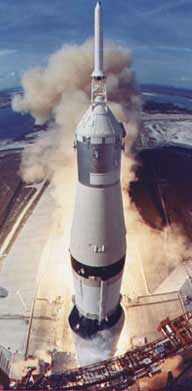 So, you think you know
the whole story?
So, you think you know
the whole story? A problem with a water filter afflicted the crew with excessive and “fragrant” flatulence throughout the entire mission.
Due to the unexpected presence of boulders, the Eagle had to fly for some distance beyond the intended landing site. The computer overloaded and they very nearly ran out of fuel. Since the Lunar Module was already below the altitude at which the astronauts could have ejected the landing stage and safely aborted, they were mere seconds away from a fatal crash when the touchdown light finally lit.
Partially because of the change in landing place, no-one knew the LM‘s exact position on the Moon until afterwards, using the laser reflectors deployed during the moonwalk. Mike Collins in Columbia, the Command Module, was never able to spot Tranquility Base from lunar orbit.
Buzz Aldrin, during the moment of silence he called for to give thanks right after the landing, took Holy Communion in the form of a small wafer and wine from a tiny chalice.
Neil Armstrong went out first because the door only worked that way in the cramped confines of the LM.
Armstrong’s historic statement actually sounded like “That’s one small step for man ...ah... one giant leap for mankind.” Neil has always claimed he said “a man” but the “a” was lost in transmission. It didn’t sound that way, although a recent analysis showed that indeed happened.. Still pretty cool.
The plaque had a mistake on it too: the date read “JULY 1969, A.D.” It should have been “JULY, A.D. 1969”. President Nixon also had the wording changed from “WE COME IN PEACE FOR ALL MANKIND” to “WE CAME IN PEACE...” Nixon, the lousy downer, scuttled the final Apollo missions, or so we've been lead to believe...
Armstrong may have been the first man to set foot on the Moon, but Aldrin was the first to pee there. He used the relief tube built into his spacesuit moments after stepping out, on live TV with millions of people watching.
Aldrin peeing with the flag
As a traditional sign of peace, Buzz planned to leave on the Moon a small gold olive branch, along with an Apollo 1 patch and two Russian cosmonaut medallions in honor of those killed in the space race. He forgot until the last moment, and simply tossed them unceremoniously onto the surface on his way back up the ladder. The astronauts also chucked out their moonboots, backpacks, a sack of garbage and their urine bags.
When the astronauts took off their helmets inside the LM after their moonwalk, they noticed a strong odor. Neil described it as “wet ashes in a fireplace” and Buzz as “spent gunpowder”. It was the smell of moondust. NASA, by the way, had been worried that moondust might explode on contact with oxygen.
The astronauts had a lot of trouble planting the American flag in the hard lunar soil, afraid it might fall over on live TV. During the lift-off from the Moon, however, Buzz watched as the Stars and Stripes indeed “toppled into the dust”.
Whiling away the hours after the mission in quarantine in Houston, Buzz filled out a government expense account report for the journey. Total amount reimbursed: $33.31.

The landing on the Moon is unquestionably the greatest technological achievement of the twentieth and possibly any other century. It is far too optimistic, however, to compare the Moon landings to Columbus’ discoveries. Forty years after the Italian navigator stepped ashore in the New World, Spain controlled the Caribbean and the conquistadors were already ravaging the Aztec Empire in Mexico. Yet, apart from a few probes such as Clementine, Apollo has not been followed up in any way.
Only a dozen men have walked on the surface of our sister world, and at this point, no one knows who will be the thirteenth. Granted that the technological difficulties are unimaginably greater in colonizing a truly “NewWorld” but still, the Apollo adventure unfortunately resembles that of the Vikings in North America. Their reach, like ours, exceeded their grasp.
In that way, the omen of the American flag at Tranquility Base has proven to be all too accurate. Hard to plant, easily toppled, and it might never be raised again.
But perhaps there was another reason for the failure to exploit the Apollo program. Perhaps, like the Vikings, we did not find an empty world, but one already occupied. That possibility, and the secret meaning of Apollo, is examined in the following series series of essays, The Magic of the Moon.